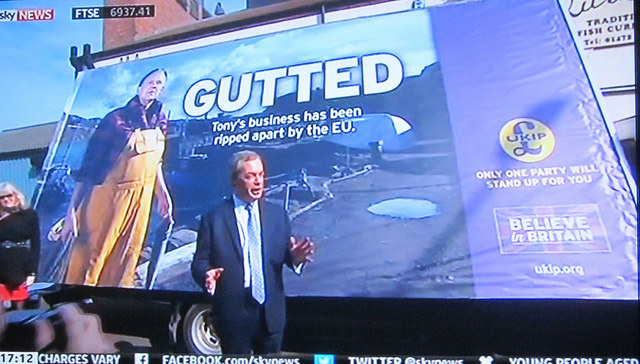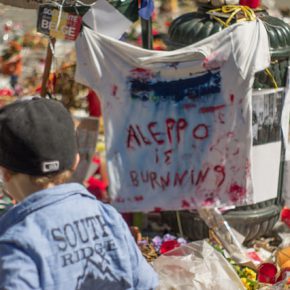In one of the most contested votes in British history, the UK has voted for the unknown. Many believed the fear of change would triumph over anger. This is a moment of profound emotion. The door is wide open and there is nothing out there, but darkness. The unknown is here. The old post-war certainties are dead.
Far-right parties in France and the Netherlands are talking about withdrawing. Brexit sets a precedent for the European Union and it’s unclear if it will be the catalyst for a wave of change.
The US fears it will be just that. No doubt the symbolic break is enough to inspire eurosceptics of left and right across the continent.
Even the murder of Labour MP Jo Cox, allegedly by Tommy Mair, failed to sway the vote far enough to prevent Brexit. Mair’s fixation with Afrikaner nationalism in South Africa and American neo-Nazi movements was not enough to condemn him. Instead, Mair’s violence was put down to mental illness. When asked for his name in court, Tommy replied: “Death to traitors, freedom for Britain!” Some began to compare Britain to late Weimar Germany.
Cameron, out!
As the news sank in for the nation, David Cameron presented his resignation. Next, Parliament will vote on the matter. The transition will take until 2018 even if there are no stalemates in negotiations. The Conservative Remain campaign only mustered 56% of Tory voters, while the Labour In campaign won over 70% of its base. Yet Labour MPs have tabled a no-confidence vote in Jeremy Corbyn. It’s as if the Blair brigade feel their europhilia has been vindicated by this vote.
This is the first putsch against Corbyn. One hopes it will fail badly, as the party membership would back the left candidate in any future leadership election. The Blairites will want to throw him overboard and impose a leader of their ilk on the party. But this seems unlikely. If Corbyn is voted out, he could stand in a new contest. He may even win with a bigger mandate than in 2015. It’s unclear if the right-wingers are aware of this possibility.
Of course, if the Remain vote had won out, the Conservative government would have moved to impose new immigration controls and squeeze concessions out of Brussels. Tory eurosceptics have always been fighting for a privileged British position within a loose European confederation. This is the tradition to which David Cameron belongs. Much like Thatcher, the European question has blown up the Cameron premiership.
Farage clip:
Unfortunately, this may mean the energy of all other political forces still fall within the nation-state. The Scottish referendum was an early sign of this, though the result was not independence. Instead we have Nigel Farage heralding an era of “British independence”. It seems Project Fear was far more successful in queling enough Scottish voters into accepting the Union. But this is not the end of the line. The shockwaves of this vote will reverberate for a long time.
David Cameron wanted the referendum to consolidate his place in the history of British Toryism. He wanted to step down on his own terms before 2020. Instead, the vote has consigned Cameron to his proper place in history. Unlike Margaret Thatcher and Tony Blair, there was nothing seizmic about Cameron – but he filled a gap. The Cameron years have only enforced the past more vigorously. The hope is that his successor (whether it is Boris or George) will serve as an incompetent caretaker before a swift defeat at the ballot box.
What a state!
Meanwhile the liberal and progressive Remain camp has been pouring scorn on the Brexit voters online and in print. There are jokes of London seceding from the UK to rejoin Europe, along with talk of moving to Scotland. Not much mention of Northern Ireland or Wales. The rest of the country is deemed an insane hinterland of xenophobes. Naturally, Brexit inspires fear in the hearts and minds of liberals across the British Isles.
It’s easy to see why, the Leave campaign has been egregious in its race-baiting and flag-wagging. Project Fear was in full swing. Nigel Farage played every card in the deck. This is why the vote spells the worst fears of EU nationals and non-British residents. It’s unclear where the vote leaves EU migrants. They are vital to the UK economy, but this vote has thrown their rights up in the air. The new immigration controls could be far more restrictive.
By comparison, the Remain campaign provided thin, lukewarm gruel to its base. Most of the people who voted to stay, I suspect, either voted out of fear or dogmatism. The core of the Remain vote was pro-EU conservatives and liberals based in London and the South. It was a campaign based on muesli, quinoa and complacent smuggery. In the end, it wasn’t enough to overcome the level of anger directed towards the status quo.
My grandfather will be celebrating his birthday this weekend. This may be one of the best birthday presents of his life. He lives in the Labour stronghold of Bolsover, where Dennis Skinner – the so-called ‘Beast of Bolsover‘ – has presided as MP since 1970. Almost 71% of voters in Bolsover voted to leave, including Skinner himself. The Beast was close allies with Tony Benn, who was calling for a referendum as early as 1968.
Even my apolitical relatives turned out for the referendum. The narrative around immigration has certainly propelled forward the forces of reaction in this campaign. However, this is not the whole picture. A great deal of Leave votes were cast in Labour areas. Voter turnout was far higher in England than in the last general election. This does not mean the Leave votes came from Labour in reflection of a working-class rightward lurch.
On the contrary, the Conservatives were only able to muster 56% of the majority they won at the election (just less than 25% of the eligible electorate), whereas Labour drew most of its voters into the Remain camp. This would suggest the main source would have been non-voters, with some overlap from various parties, that’s the 34% absent from the 2015 election. It looks like most came from the communities torn apart and left behind by the economic consensus.
It’s as if the political class abandoned vast swathes of England. The Conservatives bulldozed through the trade unions, social housing, state education and now the NHS; while Labour took the working-class vote for granted. After 40 years of degradation, many working-class voters suddenly saw an opening to inflict a deep wound on the elite and its system. In other words, this is a “fuck you” vote. It is loud and clear.
Photograph courtesy of David Holt. Published under a Creative Commons license.





